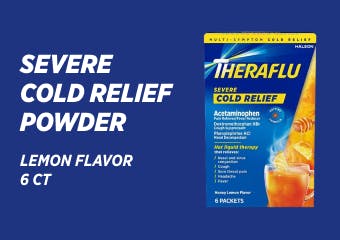What is a Dry Cough?
You may have heard the terms “wet cough” and “dry cough” before, but we’ll break them down so that it’s easy to understand the difference. A wet cough is sometimes viewed as a productive cough because it helps to move mucus that may be obstructing the airway.1,4 A dry cough is also known as a hacking cough and is generally caused by irritation or inflammation of the lungs or airway.4 It’s referred to as a dry cough because it does not involve the movement of mucus and is purely based on irritation or inflammation.4
What Causes a Dry Cough?
Generally, a dry cough is caused by irritation or inflammation of the airways, but there are any number of issues that could lead to this irritation.
A dry cough may be caused by everyday activities. When you turn on your furnace for the first time all year, it blows dust and irritants that have built up over time into dry, heated air, which can irritate your throat and nose.3 Similarly, exposure to fumes and vapors may inflame the throat and airway.1 Inhaling a strong perfume or other heavily-scented aerosolized chemical, such as hairspray or spray paint, may cause you to cough.2 If you’re a smoker, constant smoke inhalation will almost certainly contribute to a chronic dry cough that persists for months.2
Other everyday irritants that may lead to a dry cough include:2
- Mold
- Pollen
- Pet dander
However, there are also dry cough causes that are related to medical issues, some more serious than others:
- Hay fever, or allergic rhinitis, is a common allergic condition that commonly presents with a dry cough and runny nose.1
- GERD may lead to a dry cough, thanks to stomach acid backing up into the throat and acting as an irritant.1,3
- Chronic obstructive pulmonary disease (COPD) is an inflammatory lung disease that obstructs airflow from the lungs and include conditions like chronic bronchitis and emphysema.5
- Asthma can cause a dry cough. In cough-variant asthma, a dry cough is the main symptom.5
- Infections of the upper respiratory tract like whooping cough, also known as pertussis, can lead to a dry cough with a distinctive sound.3,5
- Acute bronchitis is an inflammation of the passages to the lungs.6 Chronic bronchitis may present with mucus that is yellow or green, but acute bronchitis can cause a lingering dry cough.6
- A pulmonary embolism, where a blood clot travels from the legs to the lungs, may lead to a dry cough.1
- A lung collapse, which may occur spontaneously or due to physical trauma, has symptoms that include a dry cough and shortness of breath.1
In some instances, individuals who take medication for high blood pressure may experience a side effect of a dry cough.5
If your dry cough persists, talk to your healthcare provider to understand what’s causing it and rule out any serious issues that may be causing irritation to your airways.
One of the ways to treat your dry cough due to a cold is with Theraflu products for cough. These products work on coughs by suppressing a wet or dry cough so you can recover.




